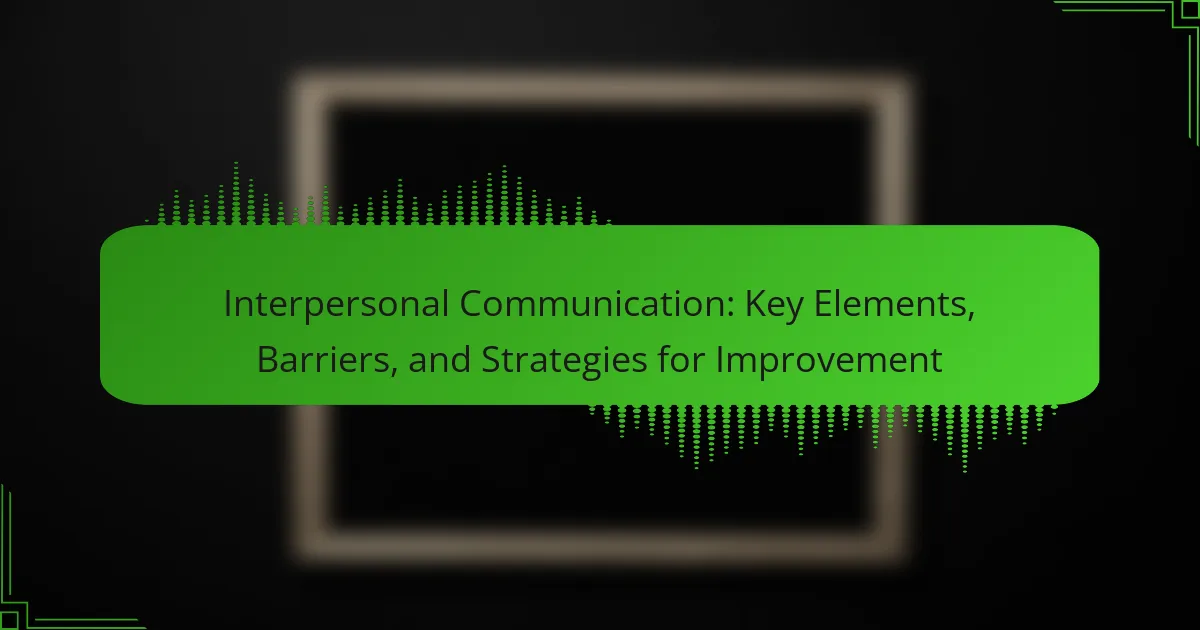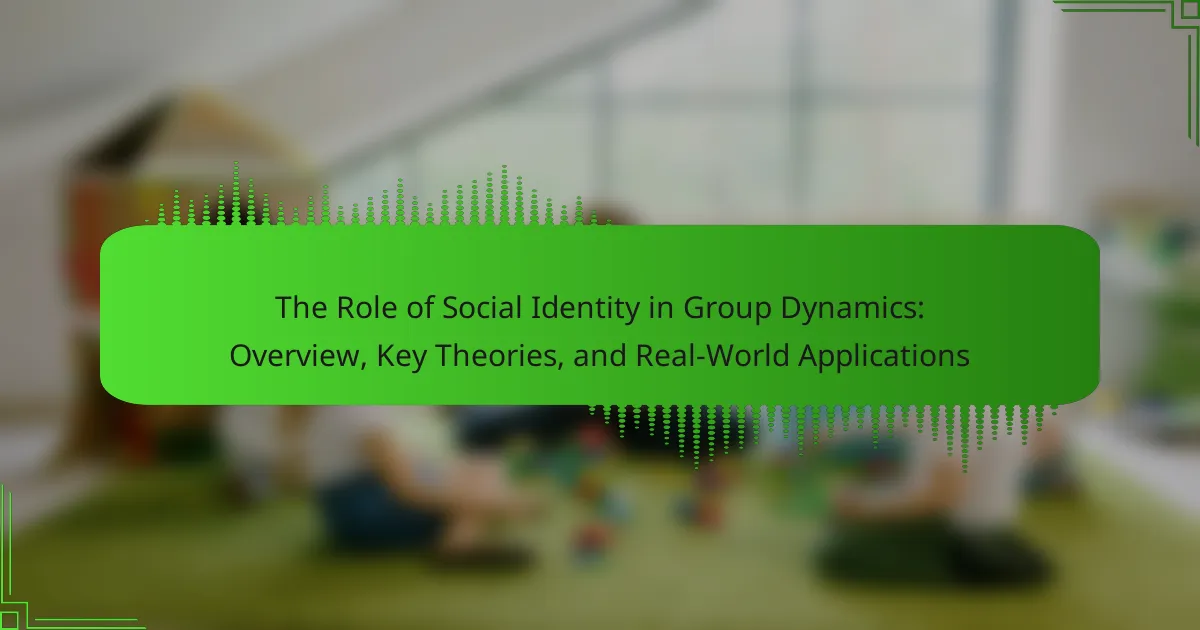Interpersonal communication is the process through which individuals exchange information, feelings, and meanings, encompassing both verbal and non-verbal interactions. Effective interpersonal communication is essential for fostering understanding and building relationships, influenced by factors such as context, culture, and individual perceptions. Common barriers to this communication include physical, psychological, language, and cultural obstacles, each of which can hinder effective interaction and lead to misunderstandings. Strategies for improving interpersonal communication include active listening, acknowledging non-verbal cues, practicing empathy, and providing constructive feedback, all of which contribute to clearer dialogue and stronger connections.
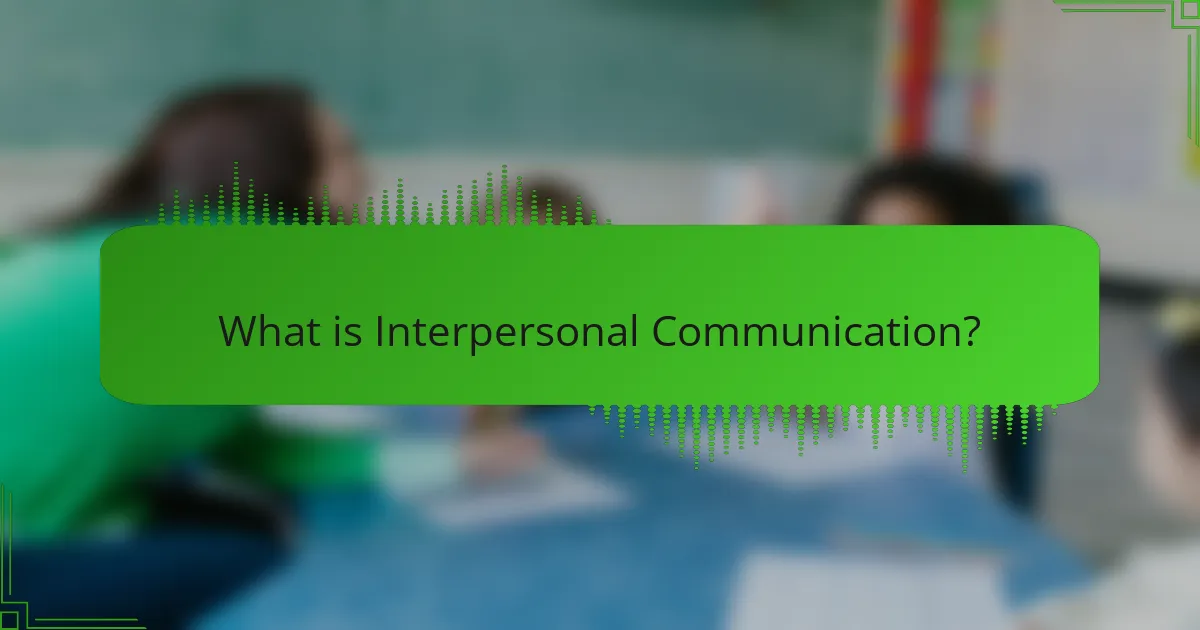
What is Interpersonal Communication?
Interpersonal communication is the process of exchanging information, feelings, and meaning between individuals. It involves verbal and non-verbal interactions. Effective interpersonal communication fosters understanding and builds relationships. According to research by Burgoon, Guerrero, and Floyd, effective communication can enhance personal and professional connections. This process is influenced by various factors, including context, culture, and individual perceptions. Clear communication can reduce misunderstandings and conflicts.
How does Interpersonal Communication function in daily interactions?
Interpersonal communication functions as a process through which individuals exchange information and meaning in daily interactions. It involves verbal and non-verbal cues to convey messages. This type of communication is essential for building relationships and understanding others. Effective interpersonal communication enhances collaboration and resolves conflicts. According to research, approximately 70-93% of communication is non-verbal, emphasizing its importance. Active listening and empathy are key components that facilitate meaningful exchanges. These elements help individuals connect on a deeper level, fostering trust and cooperation. Overall, interpersonal communication plays a critical role in navigating social situations and enhancing personal and professional relationships.
What are the key components of effective Interpersonal Communication?
Effective interpersonal communication consists of several key components. These components include active listening, empathy, clarity, and nonverbal communication. Active listening involves fully concentrating, understanding, and responding to the speaker. Empathy allows individuals to connect emotionally and understand others’ perspectives. Clarity ensures that messages are conveyed in a straightforward manner, reducing misunderstandings. Nonverbal communication, such as body language and [censured] expressions, complements verbal messages and can convey emotions effectively. Research indicates that these components significantly enhance understanding and relationship-building in various contexts.
How do verbal and non-verbal cues play a role in Interpersonal Communication?
Verbal and non-verbal cues are essential components of interpersonal communication. Verbal cues include spoken or written words that convey specific messages. These cues provide clarity and direct meaning. Non-verbal cues encompass body language, [censured] expressions, gestures, and tone of voice. They often convey emotions and attitudes that words alone may not express. Research indicates that non-verbal communication can account for up to 93% of the emotional meaning in a conversation. This highlights the importance of both types of cues in understanding each other effectively. Together, they enhance the overall communication process, ensuring that messages are conveyed accurately and understood fully.
Why is Interpersonal Communication important?
Interpersonal communication is important because it facilitates effective interaction between individuals. This form of communication enhances relationships and builds trust. It enables the exchange of ideas and emotions clearly. Good interpersonal skills can lead to improved teamwork and collaboration. Studies show that effective communication can increase productivity in workplaces. Furthermore, interpersonal communication helps in conflict resolution and understanding diverse perspectives. Research indicates that organizations with strong communication practices experience higher employee satisfaction. Overall, interpersonal communication is vital for personal and professional success.
What impact does effective Interpersonal Communication have on relationships?
Effective interpersonal communication significantly enhances relationships. It fosters understanding and trust between individuals. Clear communication reduces misunderstandings and conflicts. It allows for the expression of thoughts and feelings. This openness strengthens emotional connections. Studies show that effective communication leads to higher relationship satisfaction. According to the Journal of Social and Personal Relationships, couples with strong communication skills report greater intimacy. Overall, effective interpersonal communication is crucial for healthy and lasting relationships.
How does Interpersonal Communication influence team dynamics in the workplace?
Interpersonal communication significantly influences team dynamics in the workplace. Effective communication fosters trust among team members. Trust enhances collaboration and encourages open dialogue. Teams that communicate well show improved problem-solving capabilities. Research indicates that 86% of employees and executives cite lack of collaboration as a primary reason for workplace failures. Clear communication reduces misunderstandings and conflicts. It also promotes a positive work environment, leading to higher employee satisfaction. A study by the Institute for Corporate Productivity found that effective communication can improve team performance by up to 25%.
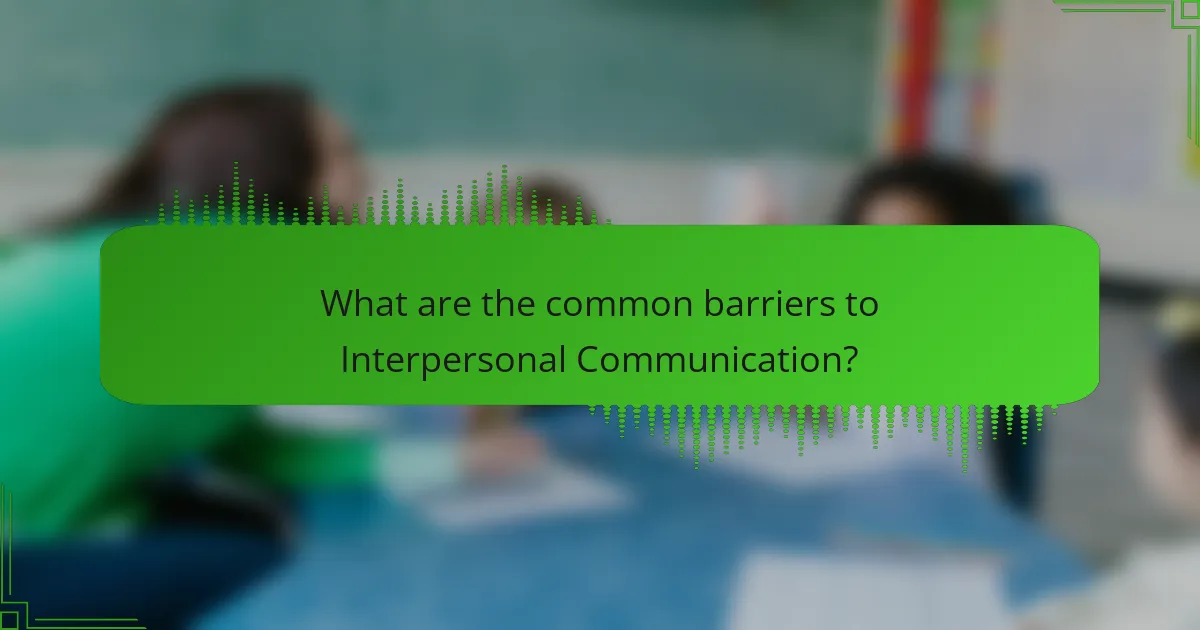
What are the common barriers to Interpersonal Communication?
Common barriers to interpersonal communication include physical barriers, psychological barriers, language barriers, and cultural barriers. Physical barriers arise from environmental factors like noise or distance. Psychological barriers involve personal emotions, biases, or mental states that affect communication. Language barriers occur when individuals speak different languages or use jargon that others do not understand. Cultural barriers stem from differing cultural backgrounds that influence communication styles and interpretations. These barriers can lead to misunderstandings and hinder effective interaction. Research indicates that addressing these barriers enhances communication effectiveness and relationship building.
How do cultural differences affect Interpersonal Communication?
Cultural differences significantly affect interpersonal communication. They influence how individuals express emotions, interpret messages, and engage in conversation. For instance, direct communication is often valued in Western cultures, while many Eastern cultures prefer indirect approaches. This can lead to misunderstandings if one party misinterprets the intent behind the communication style.
Nonverbal cues also vary across cultures. Eye contact may signify confidence in some cultures but can be considered disrespectful in others. Additionally, the use of silence can have different meanings. In some cultures, it indicates thoughtfulness, while in others, it may suggest discomfort.
Moreover, cultural norms dictate the level of formality in communication. Some cultures emphasize hierarchy and respect for authority, influencing how individuals interact with superiors.
Research indicates that cultural awareness enhances communication effectiveness. A study by Gudykunst and Kim (2003) highlights that understanding cultural differences leads to improved interpersonal relationships. Thus, recognizing and adapting to these differences is crucial for effective communication.
What specific challenges arise from language barriers?
Language barriers create significant challenges in communication. They lead to misunderstandings and misinterpretations between individuals. This can result in frustration and conflict. Additionally, language barriers hinder effective collaboration in professional settings. Team members may struggle to convey ideas clearly. This can decrease overall productivity and innovation. In healthcare, language barriers can jeopardize patient safety. Miscommunication can lead to incorrect diagnoses or treatment plans. According to a study by the Agency for Healthcare Research and Quality, language barriers increase the risk of adverse health outcomes. Overall, these challenges underscore the importance of addressing language differences in various contexts.
How can personal biases hinder effective communication?
Personal biases can significantly hinder effective communication by distorting perceptions and interpretations. These biases lead individuals to make assumptions based on preconceived notions rather than objective facts. For instance, a person may dismiss another’s viewpoint if it conflicts with their own beliefs. This dismissal can create misunderstandings and conflict. Research indicates that biases can impair listening skills, making it difficult to fully understand the message being conveyed. Additionally, biases can result in selective attention, where individuals focus only on information that supports their views. A study by the American Psychological Association found that biases can reduce empathy and increase defensiveness in conversations. This ultimately obstructs open dialogue and collaboration.
What role does emotional intelligence play in overcoming communication barriers?
Emotional intelligence plays a crucial role in overcoming communication barriers. It allows individuals to recognize and understand their own emotions and the emotions of others. This awareness fosters empathy, which is essential for effective communication. Empathy helps in addressing misunderstandings and misinterpretations. Furthermore, emotional intelligence enhances active listening skills. Active listening reduces the likelihood of conflicts arising from miscommunication. Studies show that high emotional intelligence correlates with better interpersonal relationships. For example, a study by Mayer, Salovey, and Caruso found that individuals with higher emotional intelligence are more adept at navigating social complexities. This ability directly contributes to clearer and more effective communication.
How can individuals develop emotional intelligence to improve their communication skills?
Individuals can develop emotional intelligence to improve their communication skills through self-awareness, self-regulation, empathy, and social skills. Self-awareness involves recognizing one’s emotions and their impact on communication. This can be achieved by reflecting on personal feelings in various situations. Self-regulation refers to managing one’s emotions effectively. Techniques such as mindfulness can help individuals respond rather than react in conversations. Empathy is the ability to understand and share the feelings of others. Practicing active listening enhances empathetic responses. Social skills involve effective interaction with others. Engaging in group activities can strengthen these skills. Research shows that emotional intelligence can lead to better workplace communication and collaboration. A study by Wong and Law (2002) found a positive correlation between emotional intelligence and communication effectiveness.
What strategies can be employed to manage emotions during interpersonal exchanges?
Strategies to manage emotions during interpersonal exchanges include active listening, emotional regulation, and empathy. Active listening involves fully concentrating on the speaker and understanding their message. This reduces misunderstandings and emotional escalations. Emotional regulation techniques, such as deep breathing or pausing before responding, help individuals control their reactions. Empathy allows one to understand and share the feelings of others, fostering a supportive environment. Research shows that these strategies enhance communication effectiveness and reduce conflict in interpersonal interactions.
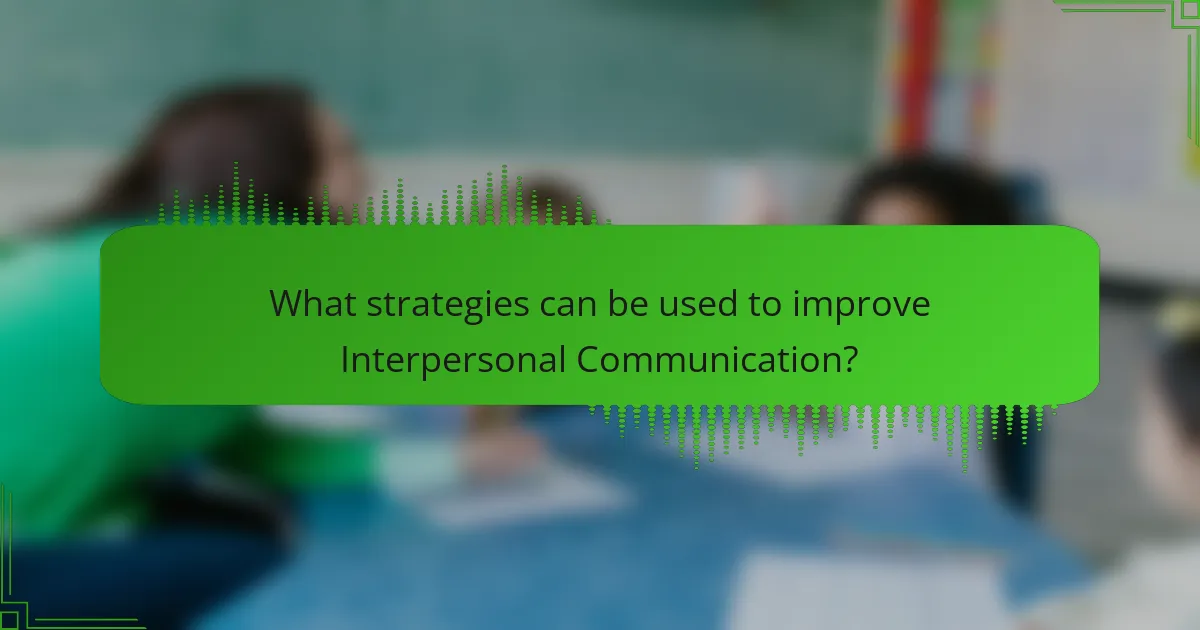
What strategies can be used to improve Interpersonal Communication?
Active listening enhances interpersonal communication. This strategy involves fully concentrating on the speaker. It requires acknowledging their message and responding thoughtfully. Asking clarifying questions further demonstrates engagement. Non-verbal cues, such as eye contact and nodding, reinforce understanding. Practicing empathy allows individuals to connect emotionally. This fosters a supportive environment for dialogue. Additionally, providing constructive feedback promotes clarity. It helps in addressing misunderstandings effectively. These strategies collectively create a more open and effective communication dynamic.
How can active listening enhance Interpersonal Communication?
Active listening enhances interpersonal communication by fostering understanding and trust. It involves fully concentrating on the speaker, which leads to better comprehension of their message. This practice encourages open dialogue and reduces misunderstandings. Research shows that active listening can improve relationships by 70%. It allows individuals to feel valued and respected, promoting a positive communication environment. Furthermore, it helps in identifying emotions and non-verbal cues, which are essential for effective interaction. By responding thoughtfully, active listeners can facilitate more meaningful conversations.
What techniques can be used to practice active listening effectively?
Techniques to practice active listening effectively include maintaining eye contact, nodding, and providing verbal affirmations. Eye contact shows attentiveness and encourages the speaker. Nodding indicates understanding and engagement in the conversation. Verbal affirmations like “I see” or “Go on” encourage the speaker to continue sharing. Additionally, summarizing what the speaker has said helps clarify understanding. Asking open-ended questions promotes deeper discussion. Finally, avoiding interruptions allows the speaker to express thoughts fully. These techniques enhance communication and demonstrate respect for the speaker’s message.
How does feedback contribute to better communication outcomes?
Feedback enhances communication outcomes by providing clarity and understanding. It allows individuals to gauge the effectiveness of their messages. When feedback is constructive, it identifies areas for improvement. This process fosters active listening and engagement. Research indicates that effective feedback can increase retention of information by up to 70%. Additionally, feedback encourages open dialogue, which builds trust among communicators. Ultimately, this exchange leads to more meaningful interactions and reduced misunderstandings.
What are some practical tips for improving Interpersonal Communication skills?
Active listening enhances interpersonal communication skills. It involves fully concentrating on the speaker. This means avoiding distractions and responding appropriately. Asking clarifying questions can further demonstrate engagement.
Nonverbal communication is equally important. Body language, eye contact, and [censured] expressions convey messages. Positive gestures can reinforce spoken words. Maintaining an open posture fosters a welcoming atmosphere.
Empathy plays a crucial role in communication. Understanding others’ feelings creates stronger connections. Acknowledging emotions can lead to more meaningful interactions.
Clear and concise language is essential. Avoid jargon or overly complex terms. Simple language ensures the message is understood by all parties.
Feedback is vital for improvement. Constructive criticism helps refine communication skills. Requesting feedback from peers can provide valuable insights.
Practicing assertiveness can enhance communication. Clearly expressing thoughts and feelings promotes respect. It also encourages open dialogue and reduces misunderstandings.
Cultural awareness is necessary in diverse settings. Understanding different communication styles fosters inclusivity. This knowledge helps navigate potential misunderstandings effectively.
How can individuals build rapport with others in various settings?
Individuals can build rapport with others in various settings by actively listening and showing genuine interest. Active listening involves giving full attention and responding appropriately. This practice fosters trust and connection. Additionally, using open body language signals approachability. Smiling and maintaining eye contact can enhance warmth in interactions. Finding common interests helps establish a foundation for conversation. Sharing personal experiences can create relatability and deeper connections. Asking open-ended questions encourages dialogue and engagement. These strategies are effective across diverse environments, from professional settings to social gatherings. Research indicates that rapport-building techniques significantly improve interpersonal relationships and communication effectiveness.
What are the best practices for clear and concise messaging?
Best practices for clear and concise messaging include using simple language, being direct, and focusing on key points. Simple language enhances understanding. Directness eliminates ambiguity. Focusing on key points ensures the message remains relevant. Additionally, using active voice makes sentences more engaging. Short sentences improve readability. Avoiding jargon prevents confusion. Visual aids can enhance comprehension. These practices lead to effective communication, as supported by studies showing clarity increases audience retention.
What resources are available for further developing Interpersonal Communication skills?
Books on interpersonal communication are valuable resources. Titles like “Crucial Conversations” by Patterson et al. provide practical strategies. Online courses from platforms like Coursera and Udemy offer structured learning. Workshops and seminars by organizations such as Dale Carnegie Training enhance skills through interactive experiences. Podcasts focused on communication, like “The Communication Guys,” share insights and tips. Additionally, joining local Toastmasters clubs fosters public speaking and interpersonal skills. These resources collectively support the development of interpersonal communication abilities.
Interpersonal communication is the process of exchanging information, feelings, and meaning between individuals through verbal and non-verbal interactions. This article explores the key components of effective interpersonal communication, including active listening, empathy, and clarity, while also addressing common barriers such as language and cultural differences. The significance of interpersonal communication in enhancing relationships, team dynamics, and conflict resolution is highlighted, along with practical strategies for improving communication skills. Additionally, the role of emotional intelligence in overcoming communication barriers is examined, providing insights into how individuals can develop their abilities for more effective interactions.
